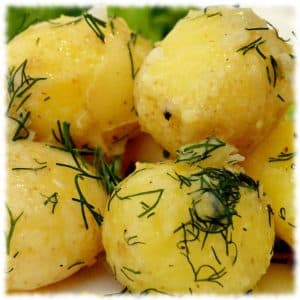How dangerous are potatoes and can you get poisoned by them?
People are suspicious of exotic fruits and vegetables, but there are products that no one suspects. One of them is potatoes. This vegetable grows in almost 100 countries and in a variety of latitudes. In Russia (and not only) potatoes have become the main food product, which is why they are popularly called “second bread”.
Potatoes have been familiar to everyone since childhood; hundreds of delicious and healthy dishes can be prepared from them. This vegetable has become so firmly established in the daily diet that there is no thought that you could be poisoned by it. But potato tubers are by no means so harmless and can lead to severe poisoning. Read how to avoid becoming a victim of poisonous potatoes and what to do if you are poisoned.
Potato poison
Potatoes belong to the nightshade family, which includes many plants with an extremely bad reputation. This is dope tobacco, bittersweet nightshade and henbane, from which poisons have been made since time immemorial. All these plants contain toxins, some of which are deadly to humans even in small quantities.
It may seem that potatoes stand apart from their dangerous relatives, but this is not so. It also synthesizes and accumulates toxic substances: solanine and hakonine. These are glycoalkaloids that are produced in potato tubers, stems, leaves and flowers to protect against insects and various diseases. The concentration of hakonine in tubers is small, so the main danger for potato lovers is solanine.
This is interesting! Solanine is a toxin specific to nightshades. Therefore, it is named according to the Latin name of this family (Solanaceae).
Most solanine is found in the peel, the layer of tuber that is located directly under it, and in the so-called eyes - potato buds. Therefore, despite the fact that most of the beneficial substances of potatoes are concentrated in the peel, you should not eat it.
Almost everyone knows from childhood that they should not eat green potatoes. Therefore, many people believe that the greens on potato skins are solanine, but this is not true. The change in color of the tubers is caused by absolutely harmless chlorophyll, which is produced there under the influence of the sun. Greens are considered a clear sign of poison, but sometimes poisonous potatoes do not differ at all in color from safe ones.
The greatest harm comes from potatoes located in open display cases in direct sunlight. After all, it is sunlight that promotes the production of solanine. Sometimes the buyer receives old tubers that have exceeded their shelf life. Such potatoes may also contain a dangerous concentration of the toxin.
This is interesting! To prevent the appearance of solanine in potatoes, in America and European countries, manufacturers pack them in opaque linen bags and set a shelf life of 3 months.
How does intoxication occur?
From the digestive system, solanine is absorbed into the blood and distributed throughout the body. On average this takes about 2 hours. The areas of greatest risk are the nervous, cardiovascular and urinary systems, as well as the respiratory organs.
Can you get poisoned from potatoes? A concentration of 2–5 mg per 1 kg of body weight is dangerous for the body. If it reaches 6 mg/kg, death is possible. For a person weighing 70 kg, a dose of 420 mg will be lethal.
Based on these figures, poisoning will occur if you eat about 2 kg of green potatoes at a time. Few people are able to cope with such a portion, and it may seem that there is no danger. But here one extremely dangerous property of this substance comes into force.
Solanine is completely eliminated from the body only after a day. If you eat poisonous potatoes several times a day for several days, the toxin accumulates in the body and can reach concentrations that are dangerous to health. It is this factor that brings trouble to those who believe that small portions of green potatoes do not harm the body.
This is interesting! One of the most widespread potato poisonings occurred in 1979 at a London boys' school. Then 78 children and several teachers suddenly began to experience abdominal pain, vomiting, diarrhea, and cramps. Some even fell into a comatose state. Investigating doctors discovered that the outbreak was caused by a bag of potatoes that had been stored in the basement for a year.
Symptoms of poisoning
Potato poisoning in its symptoms is not too different from ordinary food poisoning. The first signs can be observed 8–12 hours after consumption:
- bitterness and burning in the mouth;

- temperature increase;
- rapid breathing, shortness of breath;
- dilated pupils;
- cardiopalmus;
- prostration;
- heavy salivation;
- stomach cramps;
- nausea and vomiting;
- diarrhea;
- headache and dizziness;
- drowsiness;
- fainting, convulsions.
In some cases, the poisoned person has impaired speech coherence and confusion. Even less often, the patient falls into a comatose state. As a rule, this happens with extremely severe poisoning and depression of the nervous system.
Based on the severity of symptoms of solanine poisoning, there are 3 degrees of severity:
- For mild poisoning indigestion occurs, which is accompanied by a feeling of nausea. There may be vomiting 3-6 times a day. Often there is a headache and not very severe abdominal pain.
- In case of moderate poisoning much more pronounced symptoms appear. The patient feels strong and painful cramps in the abdomen, diarrhea and severe, frequent vomiting appear. Also, this degree of severity is characterized by dizziness, high blood pressure and heart rhythm disturbances (tachycardia).
- In case of severe poisoning the patient experiences convulsions, periodically loses consciousness, and the function of the heart and kidneys is impaired. Because solanine depresses the nervous system, some victims fall into a coma.
First aid
First aid to a victim of solanine should be provided immediately when symptoms appear. But before that, the severity of the poisoning should be determined.
In case of mild poisoning, it is enough to limit yourself to taking sorbents (for example, activated carbon) and a large amount of liquid. After 1-2 days, all signs of intoxication should disappear.
If a poisoned person becomes confused, loses coordination and speech, or starts having seizures, immediate medical attention is needed. It will not be possible to cope with such severe poisoning using improvised means.
Important! In case of poisoning of small children, pregnant women, diabetics or people with cardiovascular diseases must definitely call an ambulance, regardless of the expected severity of the poisoning.
Before the doctor arrives, you can:
- Induce vomiting and rinse the stomach with plenty of water. These steps are repeated several times until the stomach is completely cleansed, i.e., until the water coming out becomes clear.
- Reduce intoxication by giving the poisoned person activated carbon, Enterosgel or Smecta.
- Make sure that the body does not become dehydrated. The patient needs to drink plenty of fluids. You can give him water, compote or warm tea without sugar.
Treatment of poisoning
Currently, the risk of death from solanine poisoning is extremely low. Before sale, potatoes entering the store are carefully checked for the content of toxins dangerous to humans. But this does not provide a 100% guarantee of safety. Sometimes solanine is produced in tubers directly in stores if careless sellers violate storage conditions.
The duration of treatment at home is no more than 10 days. The patient must be kept at rest. He should drink as much fluid as possible, take sorbents and follow a gentle diet. It is the diet that plays a key role at this time. Its violation can lead to unpleasant complications and slow down treatment.
If the patient requires hospitalization, doctors provide infusion and enzyme therapy, as well as symptomatic treatment.
Eating potatoes for poisoning
In case of poisoning, it is necessary to carefully select food products so as not to aggravate the situation. People often wonder if they can eat potatoes if they are poisoned.After all, this vegetable is one of the main ones in the daily diet.
Eating potatoes for poisoning is not prohibited. It does not aggravate peristalsis and does not irritate the mucous membranes of the stomach and intestines. But not all potato dishes can be consumed.
On the first day of poisoning, nutritionists recommend abstaining from food altogether. From the second, you can switch to a gentle diet. The following dishes are suitable for it:
- Mashed potatoes with water. It saturates well and does not overload the stomach. The consistency should be liquid; adding butter or milk to it is prohibited.
- Boiled potatoes. You can also eat boiled potatoes if you are poisoned. The solanine present in it will be released into the water, so there is no risk of worsening the condition of the gastrointestinal tract.
- Soups with potatoes. They should not contain a lot of dressing and fat, and no spices should be added.
In addition to boiling, steaming potatoes is also possible. But this method is less safe, since steam treatment does not destroy solanine.
Important! Each person has their own recovery period after poisoning, so you need to listen to your body. If discomfort occurs, it is better to reduce portions or discard the product that caused it.
Consequences of poisoning
The consequences of potato poisoning largely depend on the dose of solanine that enters the body. Most often, mild poisoning occurs, which passes after 1–3 days and the person makes a full recovery.
In severe forms of poisoning, the consequences are more serious. Solanine can damage the nervous system and adversely affect the functions of the digestive system and kidney function. The result will be gastrointestinal diseases (gastritis, colitis or pancreatitis), chronic renal failure and asthenic syndrome (exhaustion).
Sometimes solanine poisoning causes acute renal failure, which can be fatal. Such cases are extremely rare, and with timely assistance their likelihood is reduced to zero.
Prevention measures
Despite the fact that sometimes the high concentration of solanine in potatoes cannot be determined with the naked eye, there are a number of techniques and rules that will help protect against poisoning:
- It is safest to buy pre-packaged potatoes that have the packaging date marked on the packets. In this case, there is no risk of purchasing stale goods.

- The best way to prevent solanine buildup is to store your potatoes in a dark, cool place. Preferably in opaque linen bags.
- The tubers need to be inspected periodically. If any potatoes have turned green or sprouted, it is better to throw them away.
- You should pay attention to seasonality. In summer, autumn and early winter, you can safely eat potatoes, since the crop is still fresh and has not had time to accumulate dangerous toxins. After the New Year, it is better to limit yourself in eating potatoes.
- When growing potatoes yourself, you need to plant them at a sufficient depth. Tubers that are too close to the surface or sticking out of the ground become bitter because the solanine content in them increases sharply. It is also necessary to hill up the potatoes.
- As potatoes age, their skins become thicker and the amount of corned beef increases. Therefore, both the peel and the top layer need to be cut off from a stale root crop.
- Solanine is not always removed during cooking.Frying potatoes, on the contrary, increases (albeit slightly) their concentration, since some of the water leaves the tubers. But during cooking, this toxin is released from the potatoes into the water.
Read also:
What to do to prevent eggplants from becoming bitter and is it possible to eat bitter fruits?
How to determine whether a watermelon is a girl or a boy, and choose a sweet, ripe fruit.
Conclusion
Potatoes are an inexpensive, tasty and nutritious product from which you can prepare an incredible number of different dishes. But even with it, certain precautions must be taken to avoid solanine poisoning.
Do not eat potatoes that have turned green or sprouted. Store it in a cool, dark place. Refrain from purchasing from street vendors or stores that cannot provide adequate storage conditions. Following these simple rules will allow you to enjoy any dishes made from this vegetable without any risk to your health.